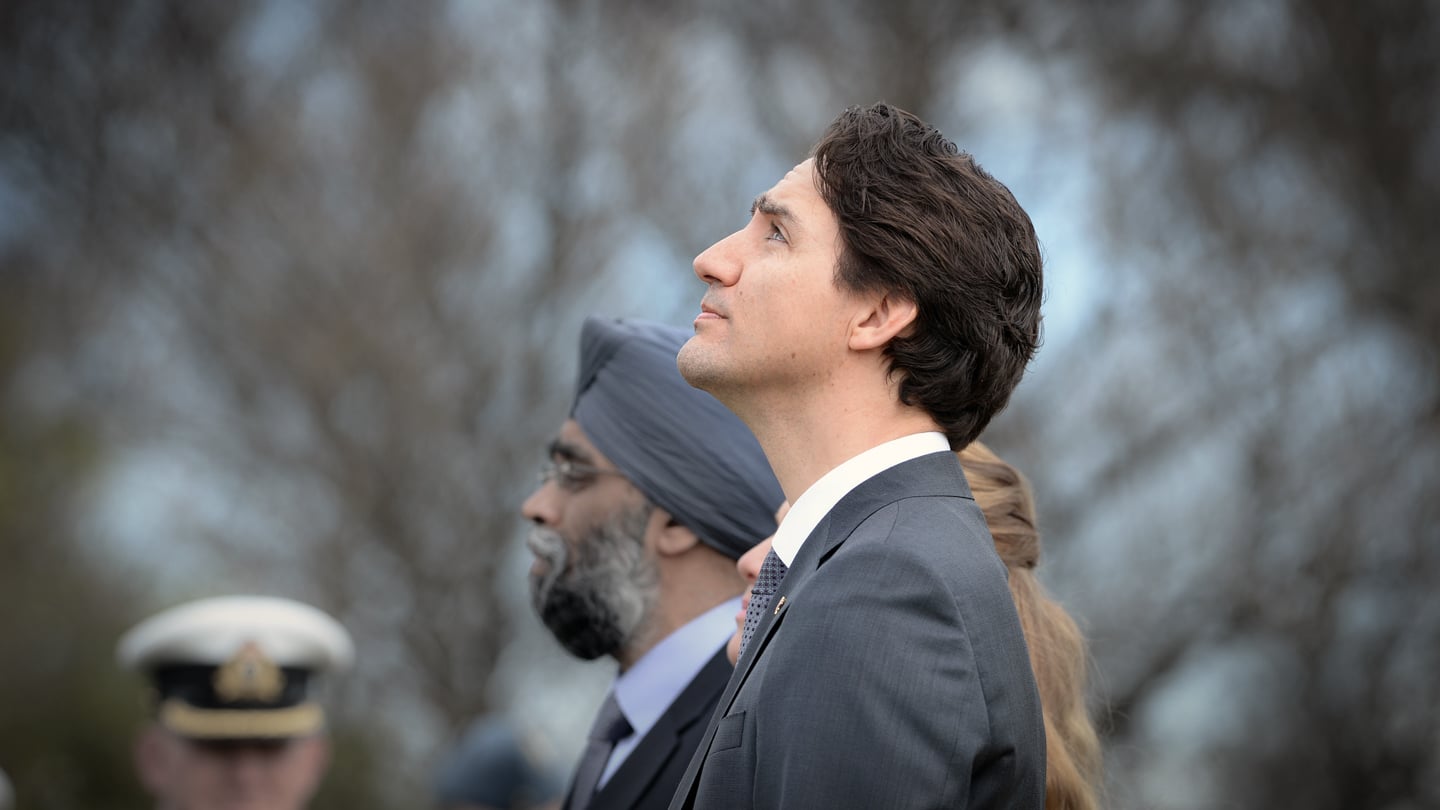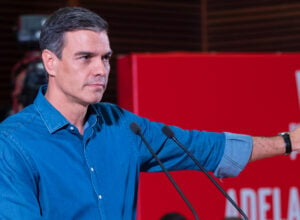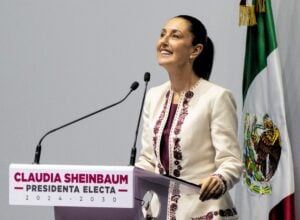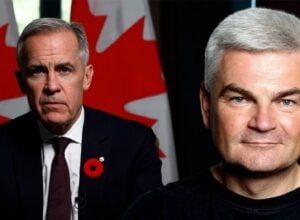Premier Kanady Justin Trudeau zapowiedział w poniedziałek swoje odejście z urzędu. Polityk pokieruje kanadyjskim rządem do momentu, aż Partia Liberalna wybierze nowego lidera, który przejmie premierowską tekę i poprowadzi ugrupowanie do wyborów. Nawet jeśli parlament – którego obrady na wniosek Trudeau zostały zawieszone do marca – nie przegłosuje na swojej pierwszej sesji wotum nieufności dla rządu (liberałowie nie mają większości), to wybory i tak muszą odbyć się najpóźniej w październiku. Dziś ich zdecydowanym faworytem są kanadyjscy konserwatyści – w sondażach mają nad liberałami przewagę ponad 20 punktów procentowych.
Nie ma nic dziwnego w tym, że w liberalnej demokracji po ponad dziewięciu latach na czele rządu polityk rezygnuje z funkcji. Kanadyjczyk ogłosił jednak swoją decyzję w bardzo znaczącym momencie, nieco ponad dwa tygodnie przed powrotem Trumpa do Białego Domu. To koniec pewnej politycznej epoki – epoki progresywnego, a przynajmniej liberalnego optymizmu, którego symbolami są takie postaci jak Barack Obama i inni przywódcy, którzy, nawet jeśli nie byli specjalnie lewicowi, to obiecywali szereg progresywnych zmian: na polu ekologicznym, praw obywatelskich, sprawiedliwości rasowej, i byli w stanie zbudować wokół nich zwycięskie liberalno-lewicowe koalicje.
Pół roku kłopotów
Kanadyjski premier odchodzi po tygodniach upokorzeń – Trump w swoim mediach społecznościowych nazywał go „gubernatorem”, a Kanadę zachęcał, by stała się 51. stanem USA. Jedną z przyczyn kłopotów Trudeau w jego własnej partii był spór o to, w jaki sposób kraj powinien przygotować się na zapowiadane przez republikanina 25-procentowe cła na produkty eksportowane z Kanady, które zdaniem większości ekonomistów wepchnęłyby kanadyjską gospodarkę w recesję. Jest ona silnie zależna od eksportu, a aż 80 proc. eksportowanych produktów trafia do Stanów. To, czy Trump spełni groźbę, ma zależeć od efektywności Kanady (taki sam warunek postawił Meksykowi) w zatrzymywaniu nielegalnej migracji i przemytu narkotyków na terytorium Stanów.
Jednak kłopoty Justina Trudeau zaczęły się nasilać już w czerwcu 2024 roku, kiedy liberałowie przegrali wybory uzupełniające w Toronto – okręgu, w którym nieprzerwanie zwyciężali od 1988 roku. We wrześniu głosowanie w kolejnym teoretycznie bezpiecznym okręgu (wygrywali w nim od jego utworzenia w obecnych granicach 10 lat temu) – położonym w Montrealu – przyniosło kolejną klęskę.
Także we wrześniu lewicowa Nowa Partia Demokratyczna (NDP) wypowiedziała porozumienie wspierające rząd. Liberałowie wygrali wybory w 2021 roku, ale nie mieli samodzielnej większości w Izbie Gmin – los ich rządu zależał od głosów lewicy. Jako oficjalny powód odcięcia się od gabinetu Trudeau NDP podała jego podejście do strajku na kolei, w rzeczywistości jednak mogło chodzić o nadchodzące wybory i chęć zdystansowania się od niepopularnego rządu. Jednocześnie NDP nie chciała wcześniejszych wyborów i nie była gotowa na głosowanie razem z konserwatystami za wotum nieufności wobec Trudeau.
15 grudnia 2024 roku dymisję złożyła ministra finansów, przez lata jedna z najbliższych współpracowniczek Trudeau, Chrystia Freeland. W liście otwartym zarzuciła premierowi, że nie docenia on powagi zagrożenia, jakie wiąże się z amerykańskimi cłami, i zamiast przygotować na nie kanadyjską gospodarkę – przede wszystkim ograniczając deficyt budżetowy – zajmuje się populistycznymi trikami wyborczymi, takimi jak zwolnienie wielu produktów kupowanych na święta (m.in. choinek) od podatku od zakupu.
Pięć dni później lider NDP Jagmeet Singh zapowiedział, że gdy tylko parlament wróci do pracy po wakacyjnej przerwie, jego partia złoży wniosek o wotum nieufności dla rządu – co przy poparciu konserwatystów wymusiłoby wcześniejsze wybory. Po dymisji Freeland, sygnalizującej utratę poparcia dla Trudeau w macierzystej partii, i deklaracji Singha premier nie miał w zasadzie innego ruchu niż ustąpienie.
Pokonany przez pandemię?
Nawet gdyby nie problemy ostatnich miesięcy, trudno byłoby wyobrazić sobie Justina Trudeau po raz czwarty prowadzącego swoją partię do wyborów. Tylko jedna trzecia badanych uważa, że dobrze wykonuje on swoją pracę, 70 proc. źle ocenia stan Kanady pod jego rządami. Od lata 2022 roku konserwatyści nieprzerwanie mają w sondażach wyższe średnie poparcie niż liberałowie.
Premier Kanady jest kolejnym liderem płacącym polityczną cenę za problemy gospodarcze wywołane przez pandemię. Choć inflacja w 2024 roku ma zmieścić się w okolicach zaledwie 2 proc., to Kanadyjczycy ciągle pamiętają rok 2022, gdy dobiła do prawie 7 proc. Ale to nie wszystko.
Jak podaje „Financial Times”, w kraju rośnie bezrobocie – obecnie sięga 7 proc. Kanadyjskie gospodarstwa domowe są najbardziej zadłużone spośród członków grupy G7, co czyni je szczególnie podatnymi na skutki ewentualnej recesji. Aż 38 proc. badanych stwierdziło, że w 2024 roku ich sytuacja finansowa była gorsza niż w roku poprzednim – to najlepszy wynik od 2021 roku, ale i tak jeden z najgorszych w ostatnich 14 latach prowadzenia podobnych badań. Aż 2 miliony Kanadyjczyków korzystało w 2024 roku z banków żywności – to o 90 proc. więcej niż w roku 2019. Jednocześnie w drugim kwartale 2024 roku nierówności dochodowe w Kanadzie osiągnęły najwyższy wynik w historii pomiarów – za co odpowiada głównie wzrost zysków z inwestycji, płynących do 20 proc. najlepiej zarabiających obywateli.
Do tego dochodzą problemy z cenową dostępnością nieruchomości mieszkalnych, zwłaszcza w dużych ośrodkach. W powszechnej opinii współodpowiedzialna za ten stan rzeczy jest „zbyt liberalna” polityka migracyjna rządów Trudeau. Dziś, jak wylicza „New York Times”, około 20 proc. ludności mieszkającej w Kanadzie urodziło się poza jej granicami, a tylko w ostatnich dwóch latach do kraju przybyło ponad 2 miliony ludzi.
Migracja cieszyła się początkowo szerokim poparciem Kanadyjczyków, jednak w ostatnich miesiącach konsensus zaczął się kruszyć. Rząd Trudeau sam postanowił wprowadzić w 2024 roku przepisy utrudniające migrantom, którzy otrzymali pozwolenie na pobyt czasowy, ubieganie się o prawo do stałego pobytu, ale dla sfrustrowanych obywateli to za mało.
Dziedzictwo Trudeau
Rosnące koszty życia, otwartość na migrantów, kryzys mieszkaniowy, przeciążenie systemu ochrony zdrowia, bezrobocie, bezradność wobec gróźb Trumpa – wszystko to rzutuje na społeczny odbiór Trudeau. Ale jak Kanadyjczycy będą go pamiętać, gdy opadnie kurz po wyborach 2025 roku? Co będzie dziedzictwem ponad dziewięciu lat rządów lidera liberałów?
Jako premier Trudeau zawsze miał talent do symbolicznych gestów, przyciągających uwagę i budzących poklask progresywnej opinii publicznej na całym świecie. W 2015 roku powołał pierwszy w historii Kanady rząd z równą liczbą kobiet i mężczyzn. Z dumą celebrował wielokulturowy charakter kraju jako jego wielki atut. Gdy w 2017 roku Trump wydał rozporządzenie wykonawcze zamykające granice Stanów dla obywateli kilku państw z muzułmańską większością, Trudeau przedstawiał się jako lider kraju otwartego na uchodźców ze wszystkich szerokości geograficznych, kultur i cywilizacji. Rozpoczął też narodową dyskusję o przewinieniach kanadyjskiego państwa wobec jego rdzennych mieszkańców.
Nie warto tego lekceważyć – lepsze nieszczerze i niewiele zmieniające ukłony wobec progresywnych wartości niż polityka otwarcie celebrująca rasowe czy narodowe uprzedzenia bądź mizoginię. Niemniej pytanie o to, co tak naprawdę pozostawia po sobie Trudeau, jest uzasadnione.
Jednym z priorytetów liberalnego rządu miała być ambitna polityka klimatyczna. Podjął on szereg działań mających przybliżyć Kanadę do założonych celów redukcji emisji – jak jednak pokazał raport Federalnego Komisarza ds. Środowiska z listopada 2024 roku, proces ten jest znacznie powolniejszy, niż zakładano, a Kanada radzi sobie z realizacją celów najgorzej spośród państw grupy G7.
Jednym z głównych narzędzi polityki klimatycznej Trudeau był podatek od emisji z ulgami dla konsumentów. Dziś jest on wściekle atakowany przez konserwatystów i przedstawiany jako źródło drożyzny oraz ograniczanie rozwoju kanadyjskiego biznesu. Po zmianie władzy najpewniej zostanie zniesiony lub poważnie ograniczony.
Trudeau uruchomił też pewne programy społeczne – najważniejszy zakłada zmniejszenie kosztów opieki przedszkolnej do 10 dolarów dziennie do 2026 roku. Dla rodziców to istotna zmiana, ale jak na ikoniczny status, jakim cieszył się premier (zwłaszcza w ciągu pierwszych dwóch lat swoich rządów), to niewiele. Trudeau zawsze próbował godzić progresywną politykę społeczną i ekologiczną z podtrzymującą status quo polityką gospodarczą – rok 2025 od 2015 różni się tym, że dla takich rozwiązań zostało bardzo niewiele przestrzeni.
Poilievre nie do końca jest „kanadyjskim Trumpem”
Być może największym sukcesem Trudeau okaże się to, że następujący po jego rządach prawicowo-populistyczny backlash w Kanadzie będzie znacznie łagodniejszy niż ten w Stanach czy wielu państwach Europy. Lider konserwatystów – Pierre Poilievre – który w tym roku najpewniej zostanie premierem, bez wątpienia posługuje się populistycznym językiem i przeciwstawia prostych ludzi liberalnym elitom, a popularność zyskał dzięki poparciu dla antycovidowych protestów z 2022 roku.
Jednocześnie, jak zwraca uwagę amerykański „Vox”, populizm Poilievre’a jest znacznie bardziej umiarkowany niż ten Trumpa. Owszem, mówi o konieczności ograniczenia migracji, ale uzasadnia to głównie sytuacją na rynku mieszkaniowym, nie demonizując migrantów. Populizm Kanadyjczyka jest w niewielkim stopniu natywistyczny.
Choć w niedawnym wywiadzie z Jordanem Petersonem – po pięciu dniach ma on prawie 3 miliony wyświetleń – Poilievre przytakuje guru alt-prawicy, gdy ten mówi o konieczności odejścia od „postnarodowej” koncepcji kanadyjskości i afirmacji „etosu Kanady jako kraju zakorzenionego w zachodniej tożsamości”, to widać wyraźnie, że bardziej niż „wojna z woke” polityka interesuje deregulacja, poluzowanie norm środowiskowych, demontaż państwa opiekuńczego i w ogóle państwowych instytucji. W wywiadzie Poilievre powtarza Kanadyjczykom: nie możecie zrealizować swoich marzeń, takich jak zakup domu, bo owoce waszej pracy idą na utrzymanie rozdętej, nieefektywnej biurokracji, a arbitralne regulacje pętają rozwój biznesu, który ucieka nam do Stanów – i ja to zmienię. Bardziej niż Trumpa przypomina aktywistów Tea Party sprzed ponad dekady.
Niewątpliwie Poilievre będzie bliższy ideologicznie Trumpowi niż Trudeau. To jednak nie musi oznaczać, że republikanin odpuści mu w kwestii ceł. Cały czas nie wiemy, na ile poważne są zapowiedzi Trumpa dotyczące handlowych relacji z Kanadą ani jak właściwie powinniśmy traktować komunikaty o 51. stanie.
We wtorek na konferencji w swojej rezydencji na Florydzie amerykański prezydent elekt znów rozważał zalety aneksji Kanady, narzekał na koszty ochrony granicy z północnym sąsiadem i niekorzystny bilans handlu z nim. Wykluczył możliwość użycia siły wojskowej, ale nie zastosowanie środków ekonomicznego przymusu. Trudno to tłumaczyć wyłącznie chęcią trollingu ideologicznie odległego Trudeau. Z takim partnerem za południową granicą najbardziej prawicowo-populistyczny kanadyjski premier może nie być w stanie ułożyć sobie dobrych relacji.

 Wspieraj
Wspieraj 

 Wspieraj
Wspieraj  Wydawnictwo
Wydawnictwo 
 Zaloguj się
Zaloguj się 















